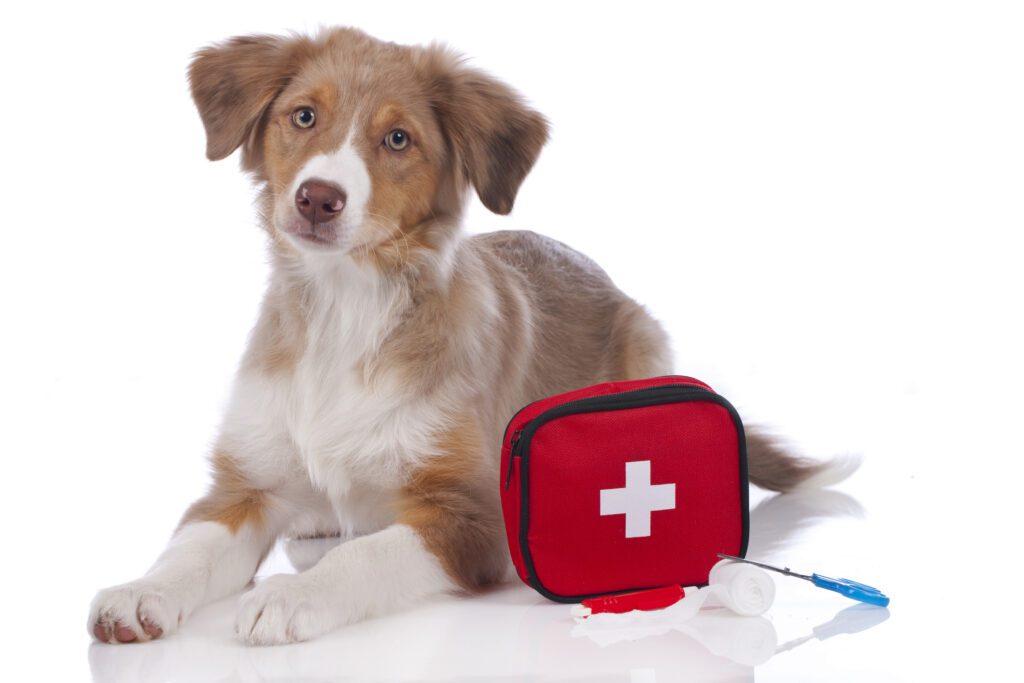Canine Safety First: The Importance of Dog First Aid Kits
As pet parents, we cherish our furry companions and strive to provide them with the best care possible. Just as having a first aid kit is essential for our human family members, it’s equally crucial to have one for our four-legged friends.
At St. Paul Pet Hospital, we understand the significance of dog first aid kits, and we encourage all our clients to consider creating one. In this article, we’ll explore what to include in these kits and why they are indispensable for every dog owner.

Why Dog First Aid Kits are Important
Dogs are adventurous creatures by nature, and their curious spirits often lead them into unforeseen situations. From minor scrapes to more serious injuries, being prepared with a dog first aid kit can make all the difference in a critical moment. Here’s why these kits are indispensable:
Immediate Response
Accidents can happen anywhere, at any time. Having a well-equipped first aid kit on hand allows you to provide immediate care before seeking professional veterinary help. Quick action can sometimes mean the difference between a minor issue and a more severe health concern.
In Remote Areas
If you enjoy outdoor adventures with your canine companion, you might find yourselves far from immediate veterinary care. In such cases, a first aid kit can be a lifeline, offering temporary solutions until you can reach a veterinary clinic.
Reduced Stress
In emergency situations, both you and your dog may be stressed. Having a dog first aid kit ready and knowing how to use it can help you stay calm and focused, providing the best care possible for your pet.
What to Include in Your Dog First Aid Kit
Now that we’ve highlighted the importance of having a dog first aid kit, let’s discuss what items should be included. These are the essentials for a well-rounded kit:
1. Sterile Gauze Pads and Bandages
Gauze pads and bandages are versatile and can be used to clean wounds, control bleeding, or provide support to injured limbs.
2. Adhesive Tape and Scissors
These are essential for securing bandages and trimming hair around a wound. Bandage scissors with rounded tips are safer to use around your pet.
3. Antiseptic Wipes or Solution
Cleaning wounds is a critical step in preventing infection. Include antiseptic wipes or a gentle antiseptic solution in your kit.
4. Tweezers and Magnifying Glass
Tweezers are handy for removing splinters, thorns, or other foreign objects from your dog’s skin. A magnifying glass can help you see small details clearly. If a foreign object is embedded deeply into your pet, do not remove it on your own.
5. Instant Cold Pack
This can be used to reduce swelling or inflammation in case of injuries. Remember to wrap it in a cloth to prevent direct contact with your dog’s skin.
6. Muzzle and Leash
In stressful situations, even the most well-behaved dog may react defensively. A muzzle and leash can help keep your dog and those providing aid safe.
7. Digital Thermometer
A digital thermometer can be used to monitor your dog’s temperature, a valuable indicator of their overall health.
8. Emergency Contact Information
Include contact information for your regular veterinarian, a nearby emergency veterinary clinic, and the ASPCA Poison Control Center (888-426-4435).
9. Your Dog’s Medical Records
Keep a copy of your dog’s medical history, including vaccinations, current medications, allergies, and any pre-existing conditions. This can be crucial information for veterinarians in emergencies.
10. Important Medications
If your dog requires specific medications for chronic health conditions, make sure you have an ample supply in your kit.
Reach Out to Our St. Paul, MN, Vet Team Immediately If Your Pet Is Having an Emergency
A well-prepared dog first aid kit is an essential tool for every dog owner. At St. Paul Pet Hospital, we encourage our clients to create and maintain these kits to ensure the safety and well-being of their beloved pets. Remember, while a first aid kit can be invaluable in emergencies, it should never replace professional veterinary care.
If your dog experiences a severe injury or illness, seek immediate help from a qualified veterinarian. In the meantime, having a well-equipped first aid kit can provide peace of mind and the ability to respond promptly in unexpected situations, helping to keep your furry friend safe and healthy.

